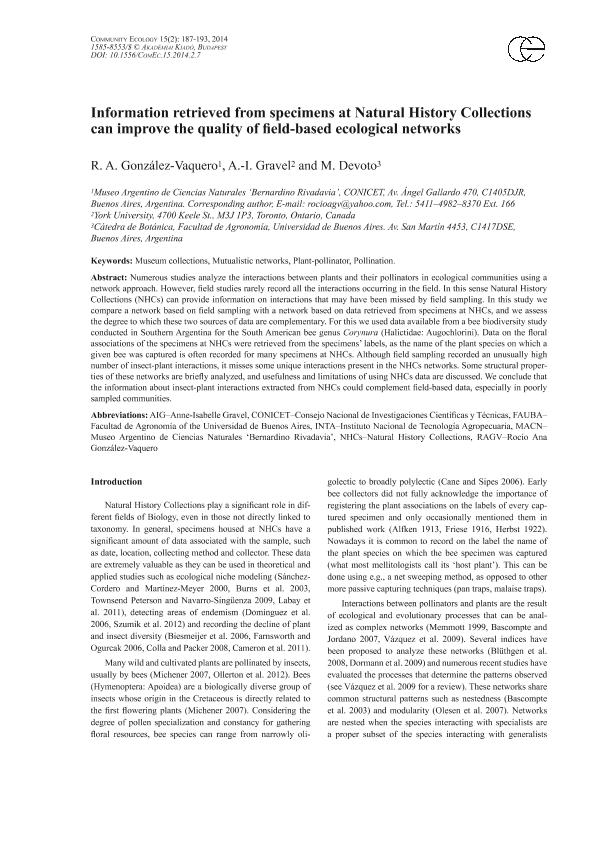Artículo
Information retrieved from specimens at Natural History Collections can improve the quality of field-based ecological networks
Fecha de publicación:
11/2014
Editorial:
Akademiai Kiado Rt
Revista:
Community Ecology
ISSN:
1585-8553
Idioma:
Inglés
Tipo de recurso:
Artículo publicado
Clasificación temática:
Resumen
Numerous studies analyze the interactions between plants and their pollinators in ecological communities using a network approach. However, field studies rarely record all the interactions occurring in the field. In this sense Natural History Collections (NHCs) can provide information on interactions that may have been missed by field sampling. In this study we compare a network based on field sampling with a network based on data retrieved from specimens at NHCs, and we assess the degree to which these two sources of data are complementary. For this we used data available from a bee biodiversity study conducted in Southern Argentina for the South American bee genus Corynura (Halictidae: Augochlorini). Data on the floral associations of the specimens at NHCs were retrieved from the specimens’ labels, as the name of the plant species on which a given bee was captured is often recorded for many specimens at NHCs. Although field sampling recorded an unusually high number of insect-plant interactions, it misses some unique interactions present in the NHCs networks. Some structural properties of these networks are briefly analyzed, and usefulness and limitations of using NHCs data are discussed. We conclude that the information about insect-plant interactions extracted from NHCs could complement field-based data, especially in poorly sampled communities.
Palabras clave:
Plant-Pollinator
,
Mutualistic Networks
,
Pollination
,
Museum Collections
Archivos asociados
Licencia
Identificadores
Colecciones
Articulos(MACNBR)
Articulos de MUSEO ARG.DE CS.NAT "BERNARDINO RIVADAVIA"
Articulos de MUSEO ARG.DE CS.NAT "BERNARDINO RIVADAVIA"
Citación
González Vaquero, Rocío Ana; Gravel, A. I.; Devoto, Mariano; Information retrieved from specimens at Natural History Collections can improve the quality of field-based ecological networks; Akademiai Kiado Rt; Community Ecology; 15; 2; 11-2014; 187-193
Compartir
Altmétricas




